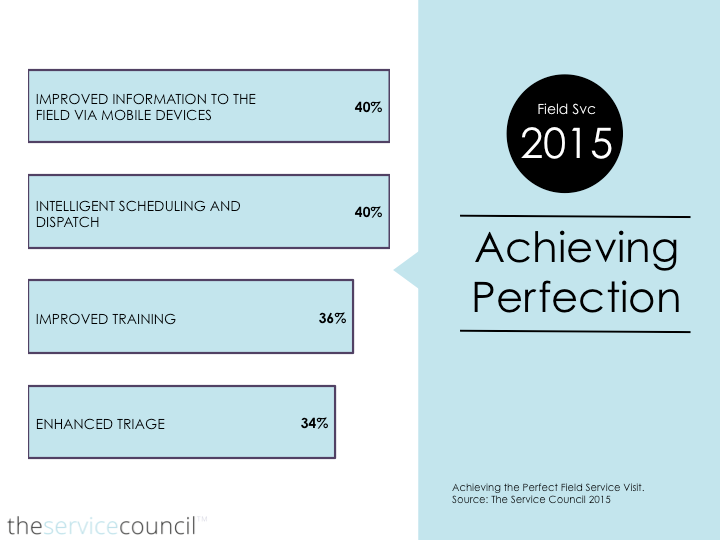What makes a perfect field service visit? If you’re in the business of field service, you’ve probably given that question a lot of thought. At The Service Council, we asked 180 organizations for their view of the perfect field service visit, and discovered that when it comes to serving customers onsite, perfection is less subjective than it might seem.
To Serve and Protect
Looking at the open-ended answers we received, some common terms emerged at once. These terms paint a picture of the modern field service organization as far more than technical experts driving well-stocked vans.
For the most part, the comments touched upon the following themes:
- When a reactive visit is needed, the field service technician should fix the issue the first-time.
- The necessary forms and paperwork are completed accurately and submitted on time in order to ensure appropriate billing and documentation.
- Once onsite, the field technician ensures that the customer is offered a longer-term solution that might prevent that issue from reoccurring.
- The field technician maximizes the time spent in front of the customer by offering other solutions that might benefit the customer.
- As a result, opportunities for additional services are identified and recorded for appropriate follow-up.
- In the future, the reactive field visit is replaced by a preventive service event.
Be Quick and Be Proactive
The top characteristics of perfection in field service are efficiency, resolution, revenue, and prevention. Efficiency is measured primarily in terms of the frequency with which service issues are resolved on the first-visit. This not only benefits the service organization, but is also what customers want. When we reviewed the top reasons customers were unhappy with their field service experience, we found:
- Field service agent did not resolve task on a first-visit.
- Cost of service visit was too high.
- Time to receive appointment was too long.
Organizations report that only one half of their field visits are perfect (as defined by the organization). The following diagram calls out the key areas that you should consider prioritizing to increase efficiency and create perfect field service visits:
It is important to note that that the top area of reform goes well beyond recommending that field agents are simply equipped with mobile devices, instead emphasizing improvements in the information available on those devices. The two critical elements of this recommendation is that the information on the device:
- Reduce or eliminate time consuming administrative tasks.
- Empower field agents to drive resolution and revenue.
Mobile Makes the Difference
The results of this study align well with the Mobile Maturity Framework which The Service Council has established. This Mobile Maturity Framework tracks the progression of investments made in mobile field service tools. The framework involves four stages:
- Stage 1 – Replace – Automating paper-based processes.
- Stage 2 – Remove – Removing obstructions to productivity.
- Stage 3 – Resolve – Improving resolution capacity.
- Stage 4 – Build – Empowering agents to build and enhance relationships.
Most mobile deployments are still stuck in stages 1 and 2 and its time to maximize mobile investments by moving to stages 3 and 4. It’s worth noting that all mobile investments don't need to follow a staggered approach. Stages 1 and 2 aren’t necessary for stages 3 and 4 to happen. It’s just that the returns tied to Stages 1 and 2 are typically how additional investments in mobility are justified. In general, the benefits seen at stages 3 and 4 are more powerful and much more impactful when considering the overall growth of a service business.
Over the course of the next month, The Service Council, SAP, Genband, and Deloitte, are embarking on a journey to discuss and debate the Mobile Maturity Framework. The intent of this debate and discussion is to empower service leaders with a more sustainable view of mobility and its impact of empowering the field service workforce. The components of the debate include:
- Webinar: Next Generation Field Service (September 23rd @ 11:00am EDT: Register)
- InService Podcast Interviews: Mobile Maturity Defined
- A Published Case Study - Maximizing Mobile Results in Field Service: The Genband Story
We hope that you join us on the journey and involve yourselves in the overall dialog.

